What is Preeclampsia?
Preeclampsia is a condition that occurs when a pregnant woman develops high blood pressure (140/90mmHg and above) and protein in urine during late pregnancy, typically past the 20th week of gestation.
A superimposed preeclampsia, on the other hand, is a term used to describe a condition when a woman with chronic hypertension develops preeclampsia during pregnancy.
In the past, preeclampsia was called toxemia because scientists suspected that it might be caused by some sort of a toxin. This term is still in use in some countries today.
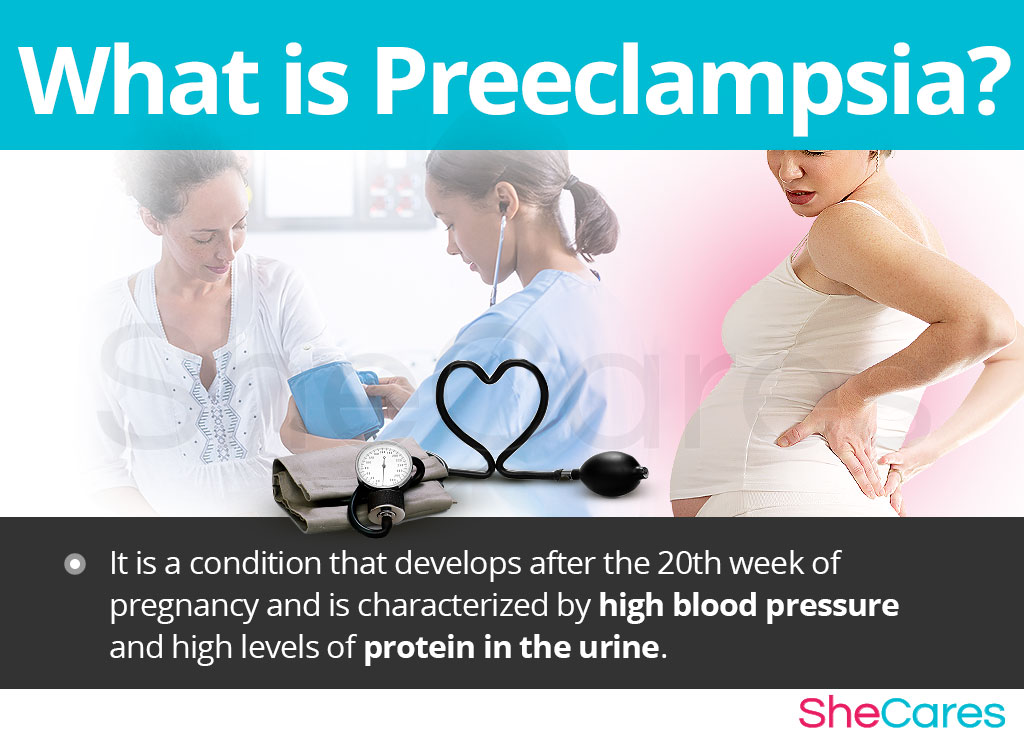
Causes and Risk Factors of Preeclampsia
The exact causes of preeclampsia are unknown; however, the following risk factors have been associated with increasing the risk of developing this pregnancy complication:
- First pregnancy
- Overweight and obesity
- Family history of preeclampsia
- Previous history of preeclampsia
- Multiple gestations (i.e. twins, triplets, etc.)
- Being pregnant at the age of 40 and older
- History of hypertension, kidney disease, or diabetes
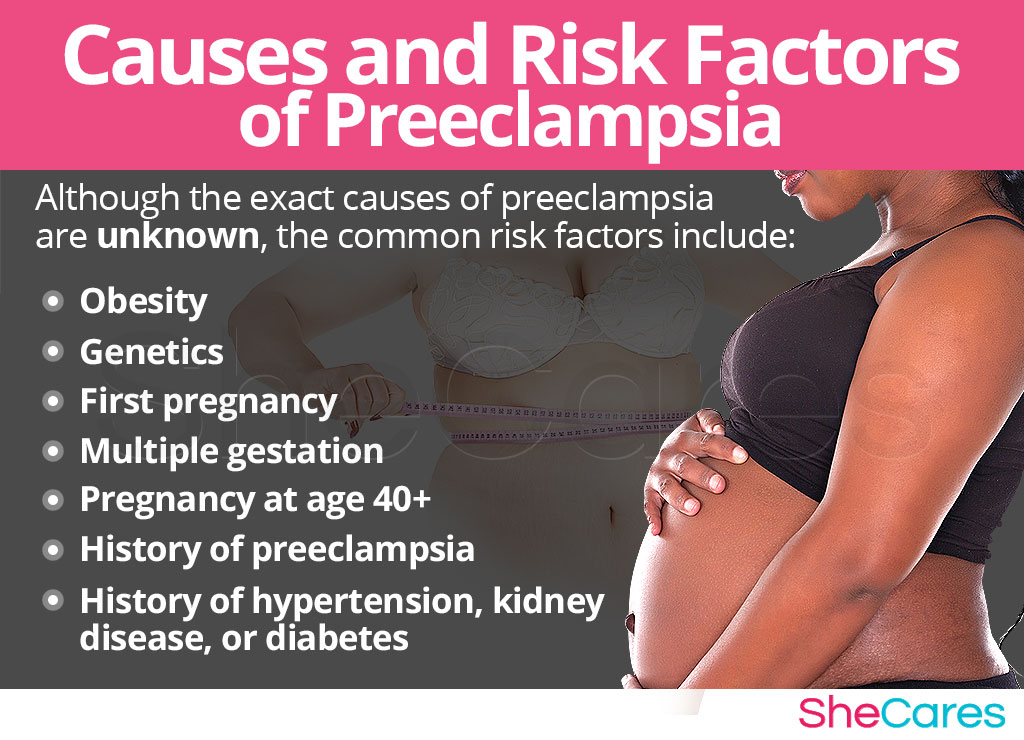
Effects of Preeclampsia on Pregnancy
Developing preeclampsia in pregnancy can negatively affect both mother and her growing baby.
Effects on the Baby
The severity of preeclampsia and the week of gestation determine the extent of its effects on the baby. Severe preeclampsia might prevent the baby from getting enough oxygen and nutrients, leading to fetal growth retardation that might predispose them to developing:
- Learning disabilities
- Cerebral palsy, epilepsy, deafness, or blindness
- Hypertension, heart and renal disease, and diabetes
Effects on the Mom
Severe preeclampsia can also compromise the health of the mother, causing eclampsia with seizures, damage to the liver, kidneys, and heart as well as stroke or even death.
Women with a history of preeclampsia are also at a higher risk of developing heart disease, hypertension, diabetes, or kidney disease later on in life.
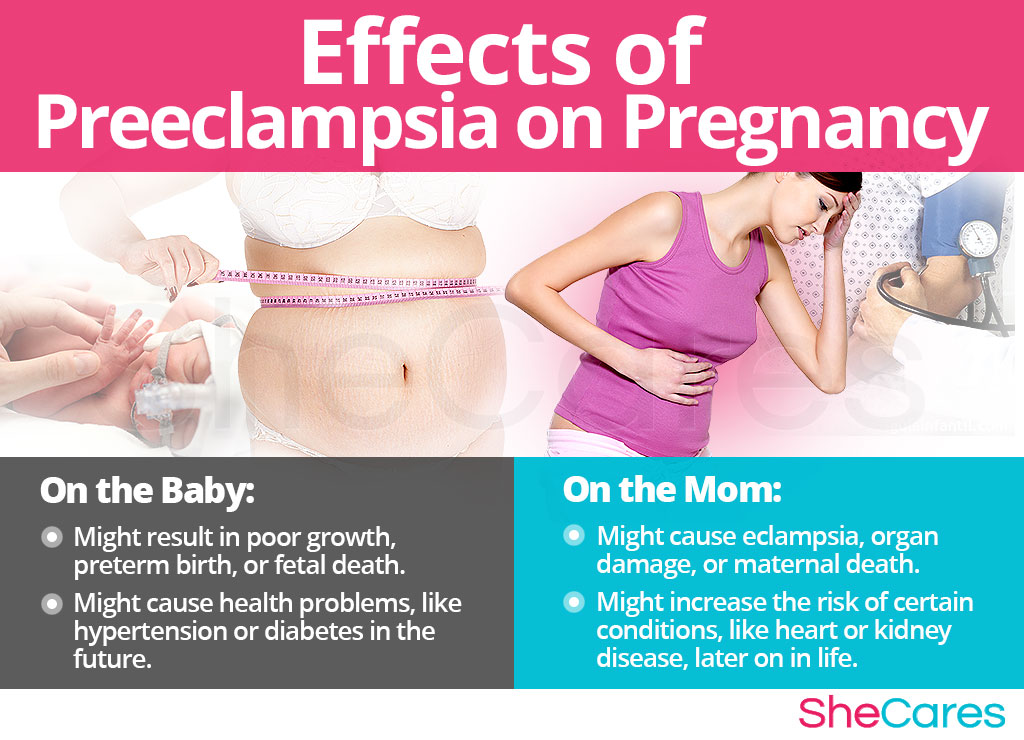
Risks and Complications
Severe preeclampsia can result in placental abruption, HELLP syndrome, preterm birth, organ failure, and maternal and fetal death.
Diagnosis of Preeclampsia
Preeclampsia in pregnancy is diagnosed with a physical exam and medical tests based on various signs and symptoms.
Signs and Symptoms of Preeclampsia
Although not all women with preeclampsia experience obvious symptoms, the most common ones include:
Symptoms of Preeclampsia
- Persistent headache
- Trouble breathing
- Swelling of the hands, face, and eyes
- Abdominal pain
- Pain in the right shoulder
- Infrequent urination
- Vision problems
Signs of Preeclampsia
- Blood pressure above 140/90mmHg
- Proteinuria (protein in the urine)
- Elevated liver enzymes
- Low platelets count
- Edema
- Sudden weight gain
- Eclampsia
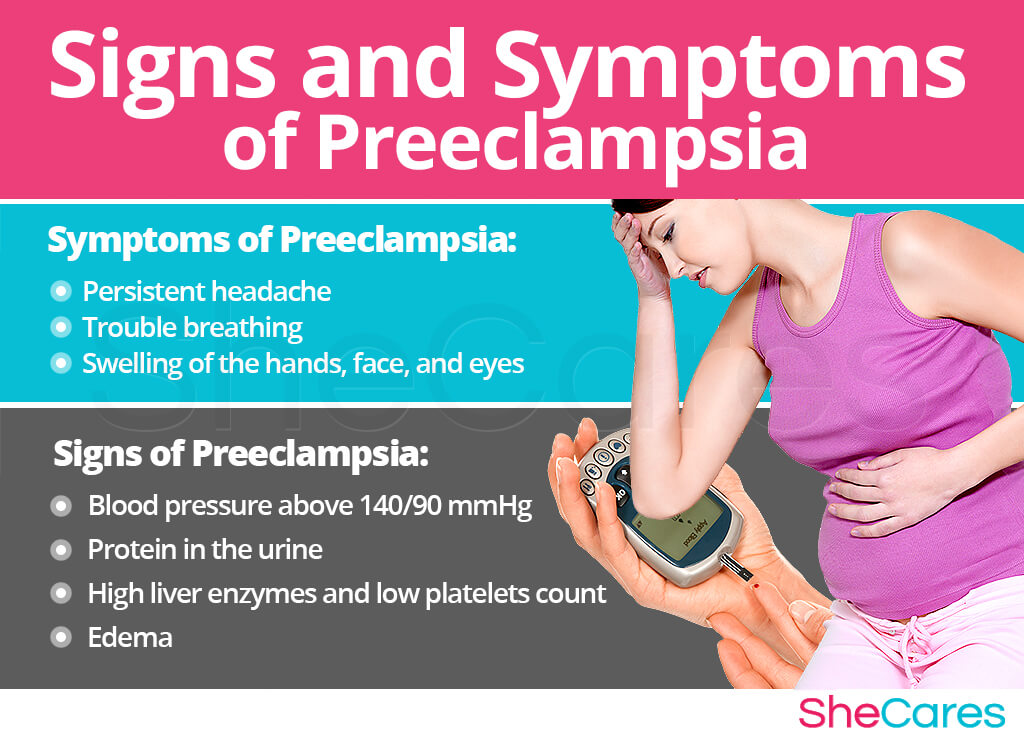
Preeclampsia Tests
The diagnosis and progression of preeclampsia are determined with the following tests:
Blood tests are ordered to verify the levels of protein in the urine, liver enzymes, and platelet count.
Non-stress test can monitor the baby's heartbeat and movement.
Ultrasound can help monitor fetal growth and help decide if a preterm delivery is necessary.
Prevention of Preeclampsia
Although there is no way to prevent preeclampsia, certain practices implemented before conceiving have been shown to reduce the likelihood of developing this serious complication:
Managing your chronic health conditions before getting pregnant, especially hypertension.
Reaching a healthy weight and maintaining it throughout pregnancy.
Exercising regularly to maintain stable blood pressure and reduce stress.
Quitting addictions, such as smoking or alcohol, before conception.
Resolving any nutritional deficiencies, particularly selenium and potassium, and hormonal imbalances with hormone-stimulating supplements, like Macafem.
Keeping a balanced, low-sodium diet composed of omega-3 fatty acids, calcium, and vitamins C, D, and E from various sources, such as low-mercury fish, eggs, whole grains, and green leafy vegetables.
Treatment and Management of Preeclampsia
Treatment of Preeclampsia
The only effective treatment for preeclampsia is delivering the baby to prevent further complications. If you are at 37 weeks of gestation or later, you might be given medications to induce labor or get a C-section. Sometimes preeclampsia is so severe that the baby has to be delivered as early as at 34 weeks.
In most cases, the signs and symptoms of preeclampsia disappear within six weeks after delivery. You are more likely to develop it in subsequent pregnancies, but usually, it is less severe.
Management of Preeclampsia
If you have a mild preeclampsia or you are at less than 37 weeks, it might be more beneficial to delay delivery as much as it is safely possible to allow the baby to grow. In that case, you might be ordered bed rest or might be hospitalized in order to:
- Closely monitor maternal organ function and fetal growth
- Decrease blood pressure and encourage blood flow to the fetus
- Prevent seizures with medications
- Administer steroid injections to help the baby develop its lungs
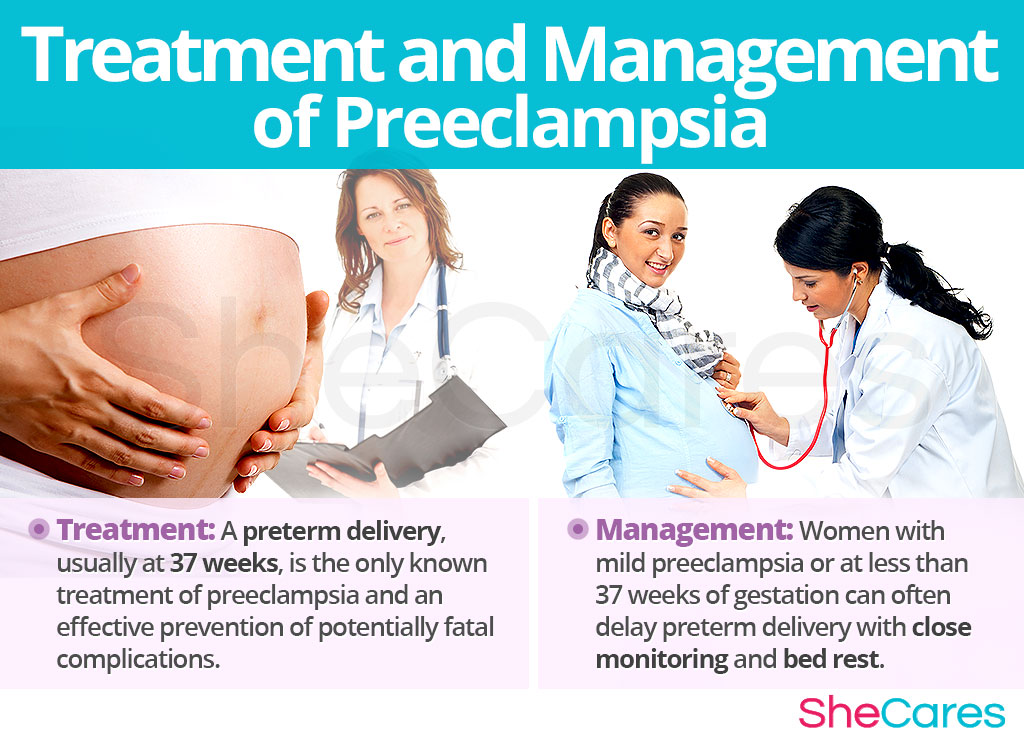
Key Takeaways
Preeclampsia is undeniably a serious pregnancy complication, responsible for up to 15% of maternal and 10% of fetal deaths around the world. Fortunately, ever progressing medicine continues to discover more effective ways to prevent preeclampsia from interfering with the natural progression of pregnancy and enable women to bring their babies safely to term. Moreover, keeping wholesome lifestyle habits, like a balanced diet, healthy weight, and daily physical activity can effectively aid in preeclampsia prevention.
Sources
- American Heart Association. (2013). Preeclampsia. Retrieved January 16, 2018 from http://circ.ahajournals.org/content/circulationaha/128/17/e344.full.pdf
- Annals of Epidemiology. (2007). Diet during Pregnancy and Risk of Preeclampsia or Gestational Hypertension. Retrieved January 16, 2018 from https://www.ncbi.nlm.nih.gov/pmc/articles/PMC2532559/
- Better Health. (2011). Pregnancy – preeclampsia. Retrieved January 16, 2018 from https://www.betterhealth.vic.gov.au/health/healthyliving/pregnancy-pre-eclampsia
- CDC. (2016). Pregnancy Complications. Retrieved January 16, 2018 from https://www.cdc.gov/reproductivehealth/maternalinfanthealth/pregcomplications.htm
- Eunice Kennedy Shriver National Institute of Child Health and Human Development. (2017). Preeclampsia and Eclampsia. Retrieved January 16, 2018 from https://www.nichd.nih.gov/health/topics/preeclampsia/conditioninfo
- March of Dimes. (2017). Preeclampsia. Retrieved January 16, 2018 from https://www.marchofdimes.org/complications/preeclampsia.aspx
- Medline Plus. (2017). High Blood Pressure in Pregnancy. Retrieved January 16, 2018 from https://medlineplus.gov/highbloodpressureinpregnancy.html
- Women's Health. (2017). Pregnancy complications. Retrieved January 16, 2018 from https://www.womenshealth.gov/pregnancy/youre-pregnant-now-what/pregnancy-complications
